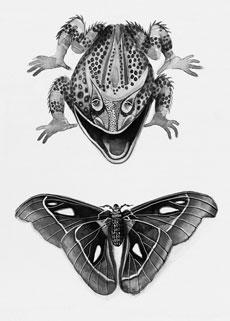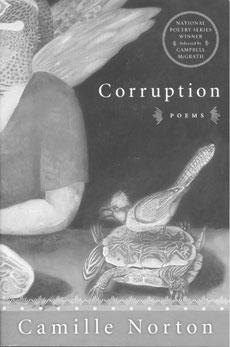“People have criticized me for being to funny,” UMass Boston alumni Camille Norton said to the small group gathered on the sixth floor of Wheatley. Norton was back at UMB, for the first time in 24 years, to read from her new book, her first book of poems, Corruption. Norton speaks as though she has known you for years. Maybe it’s this ability to connect to the audience so effortlessly that ruffles the feathers of her critics.
“I love that connection between prostitution and the Medici princes,” said Norton in the midst of reading her poem, “Corruption.” The Medici princes were wild, Dionysian nobles. The Florentine, Machiavelli feuded with the Medicis, and wrote a book, The Prince, published in 1532. The Prince described the corrupt methods for a prince to gain and hold power. Norton is a historian and a poet. It is history which informs some of my favorite lines from the poem, “Corruption,” At night, when the sewers run into the streets of San Lorenzo / and ripeness mixes inside the stench from the Arno, // we breath it in, the Princes and I,” Norton delivers this line with a smile creeping across her lips. What a wonderful feeling to feel so intimately connected to the past.
“Italy is a mausoleum,” Norton said. She spent a great deal of time in Italy, studying the art, and history. Later in an email, she wrote, “I write very much out of a process that is one part intuition and one part research. I am an inveterate reader of history, including the local history of small towns, as well as the more colorful history of nations.” Norton has a gift for bringing history to life. She writes of Napoleon, Dante, Cortés; she references artists and their works, including a three-part poem about three paintings by Caravaggio, John in the Wild IV, Judith and Holofernes, and Medusa. A book of Florentine art would be an excellent accompaniment to Corruption. Norton makes it easy for amateur scholars to look up the artwork. The title, artist and year of the work are listed under the title of the poem that refers to the work.
Norton said, “Most people give me a little smile when they see the title, ‘Oh – Corruption!” Corruption makes headlines every day from Tom Delay to the funds siphoned out of Iraq and into contractors’ pockets. Norton’s book of poetry is no Michael Moore rant against the powers that be. “The world is beautiful and corrupt,” Norton said. The title came to her when she was put up in a hotel in Florence that used to be a brothel. Norton’s poem, “Three Slaves by Michelangelo Buonarroti” is about sculptures commissioned by Pope Leo X, that Leo X wasn’t able to finance. The sculpture of Atlas is unfinished. Norton writes, “There’s a block of stone where his head should be. // Unlike David, who has a head wrapped in acanthine curls, / a slingshot, buttocks, and inescapable genitals, // Atlas has only the burden of the material against which he / struggles – / raw marble, a torso, one shoulder, one heroic arm.”
Norton’s voice is kind, like that of a friend washing dishes with you in the kitchen after dinner. Art is a fine subject of conversation amongst friends. Norton’s many poems about paintings have the effect of friendly commentary, like that you might hear from a friend on a visit to the museum. One of Norton’s poems, “Wild Animals I Have Known” is dedicated to her friend Sue Johnson’s Alternate Encyclopedia. Johnson is the Chair of the Department of Art and Art History at St. Mary’s College of Maryland. Johnson paints pictures that reexamine fairy tale creatures such as the “The Frog Prince,” “The Ugly Duckling,” and “Paul Bunyan.” Norton writes, “A prince is a man in a frog suit. / A woman is a lure in the shape of a hook. / I favor fringe, the soft effect of fabric over steel. / I like pretty hooks and feathers. I like the feminine deal.”
Norton came to UMB at the age of 25, in an email she says, “I worked with a concentration that I now see was the concentration of a graduate student. To support myself, I waited tables and cleaned houses, and so the idea of studying literature-an in particular of reading the nineteenth century novel as a way of entering the past-seemed to me to be a complete privilege. I couldn’t understand students who approached classes as if they were punching a time-clock in a factory. I thought they were foolish, dangerously foolish. I studied with extraordinary teachers at U Mass, among themMartha Collins (for whom I worked as a student assistant in the Creative Writing Program), Linda Dittmar, and Lois Rudnick.” In her senior year, Norton transferred to UMass Amherst, although she received her degree from UMB, she wrote, “no professor there touched me as the professors at UMass/Boston had. There was something about Boston and about a cohort of students who worked for a living while studying, as well as a faculty passionately committed to democratic education, that made U Mass/Boston the true college experience I treasure.”
Norton said that her favorite poets right now, to name a few, are Anne Carson, Wallace Stevens, Elizabeth Bishop, H.D., Marianne Moore, Robert Lowell, and Adrienne Rich. She loved Harvard Square, the Grolier Bookshop, Harvard Bookstore, Au Bon Pain, The Blacksmith House, and she loved the Middle East in Central Square. Norton drives a 1999 Honda Accord. Norton’s motto is “Nothing is Wasted.”
Norton has received much critical acclaim and many awards for her poetry and teaching. Her writing has appeared in many small publications, but Corruption is her first book. Norton teaches English at the University of the Pacific in Stockton California. Corruption is available at the UMB bookstore, and at independent bookstores throughout the city.


